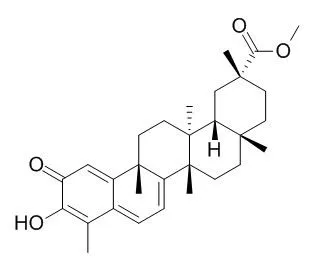| Cell Research: |
| Oncol Rep. 2015 Mar;33(3):1388-94. | | Inhibitory action of pristimerin on hypoxia‑mediated metastasis involves stem cell characteristics and EMT in PC-3 prostate cancer cells.[Pubmed: 25571882] | The aim of the present study was to investigate whether Pristimerin affects the bone metastasis, stem cell characteristics and epithelial-mesenchymal transition (EMT) of prostate cancer (PCa) PC-3 cells subjected to hypoxia.
METHODS AND RESULTS:
The PC-3 cells were cultured under hypoxia or normoxia for 48 h and were then treated with increasing concentrations of Pristimerin from 0 to 0.8 μmol/l, under normoxia. Hypoxia‑inducible factor-1α (HIF-1α) was detected by western blotting. Proliferation was assessed with the CCK-8 assay. Transwell invasion assay was used to analyze the potency of invasion. Stem cell characteristics were detected by sphere formation, colony formation assay and western blotting, including CD44, KLF4, OCT4 and AGO2, which are stem cell characteristic-related markers. EMT was confirmed by the expression changes of EMT-related markers, including N-cadherin, fibronectin, vimentin and ZEB1, which were evaluated by western blotting. The addition of Pristimerin to the medium reduced the hypoxia-induced PC-3 cell proliferation in a dose-dependent manner. Pristimerin effectively inhibited hypoxia‑induced invasion of the PCa cells in vitro. Moreover, the treatment of cells with Pristimerin induced the reversal of hypoxia-induced stem cell characteristics and EMT, which was confirmed by sphere formation, colony formation assay and the expression changes of CSC- and EMT-related markers. The reversal of hypoxia‑induced stem cell characteristics and EMT in the PCa cells by low-dose Pristimerin was dose‑dependent.
CONCLUSIONS:
These results showed that treatment with Pristimerin may be a potential strategy for the suppression of hypoxia-induced metastasis through the reversal of hypoxia-induced stem cell characteristics and EMT in cancer cells, which justifies the potential use of Pristimerin as a practical chemopreventive approach for patients with PCa. | | J Integr Med. 2014 Jan;12(1):20-34. | | Pristimerin enhances recombinant adeno-associated virus vector-mediated transgene expression in human cell lines in vitro and murine hepatocytes in vivo.[Pubmed: 24461592] | In the present study, we systemically evaluated the ability of two bioactive compounds from traditional Chinese medicine, celastrol and Pristimerin, to enhance recombinant adeno-associated virus (rAAV) serotype vector-mediated transgene expression both in human cell lines in vitro, and in murine hepatocytes in vivo.
METHODS AND RESULTS:
Human cell lines were infected with rAAV vectors with either mock treatment or treatment with celastrol or Pristimerin. The transgene expression, percentage of nuclear translocated viral genomes and the ubiquitination of intracellular proteins were investigated post-treatment. In addition, nonobese diabetic/severe combined immunodeficient gamma (NSG) mice were tail vain-injected with rAAV vectors and co-administered with either dimethyl sulfoxide, celastrol, Pristimerin or a positive control, bortezomib. The transgene expression in liver was detected and compared over time. We observed that treatment with Pristimerin, at as low as 1 μmol/L concentration, significantly enhanced rAAV2 vector-mediated transgene expression in vitro, and intraperitoneal co-administration with Pristimerin at 4 mg/(kg·d) for 3 d dramatically facilitated viral transduction in murine hepatocytes in vivo. The transduction efficiency of the tyrosine-mutant rAAV2 vectors as well as that of rAAV8 vectors carrying oversized transgene cassette was also augmented significantly by Pristimerin. The underlying molecular mechanisms by which Pristimerin mediated the observed increase in the transduction efficiency of rAAV vectors include both inhibition of proteasomal degradation of the intracellular proteins and enhanced nuclear translocation of the vector genomes.
CONCLUSIONS:
These studies suggest the potential beneficial use of Pristimerin and Pristimerin-containing herb extract in future liver-targeted gene therapy with rAAV vectors. | | Int J Oncol. 2014 May;44(5):1707-15. | | Pristimerin, a quinonemethide triterpenoid, induces apoptosis in pancreatic cancer cells through the inhibition of pro-survival Akt/NF-κB/mTOR signaling proteins and anti-apoptotic Bcl-2.[Pubmed: 24603988] | Lack of effective therapeutics for pancreatic cancer at the present time underscores the dire need for safe and effective agents for the treatment of this malignancy. In the present study, we have evaluated the anticancer activity and the mechanism of action of Pristimerin (PM), a quinonemethide triterpenoid, against MiaPaCa-2 and Panc-1 pancreatic ductal adenocarcinoma (PDA) cell lines.
METHODS AND RESULTS:
Treatment with Pristimerin inhibited the proliferation and induced apoptosis in both cell lines as characterized by the increased Annexin V-binding and cleavage of PARP-1 and procaspases -3, -8 and -9. Pristimerin also induced mitochondrial depolarization and the release of cytochrome c from the mitochondria. The induction of apoptosis by Pristimerin was associated with the inhibition of the pro-survival Akt, NF-κB and mTOR signaling proteins and their downstream intermediaries such as Foxo-3α and cyclin D1 (Akt); Cox-2 and VEGF (NF-κB); p-S6K1 and p-4E-BP1 (mTOR) as well as PKCε. Treatment with Pristimerin also inhibited the expression of anti-apoptotic Bcl-2 and survivin but not Bcl-xL. The downregulation of Bcl-2 by Pristimerin was not due to proteasomal or lysosomal proteolytic degradation of Bcl-2, since treatment with Pristimerin in the presence of proteasomal inhibitors MG132 or lactacystin (LAC) or calpain inhibitor MG101 failed to block the downregulation of Bcl-2 by Pristimerin. On the other hand, RT-PCR analysis showed the inhibition of Bcl-2 mRNA by Pristimerin in a dose-related manner, indicating that inhibition of Bcl-2 by Pristimerin is mediated through the suppression of Bcl-2 gene expression.
CONCLUSIONS:
Thus, the mechanistic understanding of the antitumor activity of Pristimerin could facilitate in vivo efficacy studies of Pristimerin for pancreatic cancer. |
|






 Cell. 2018 Jan 11;172(1-2):249-261.e12. doi: 10.1016/j.cell.2017.12.019.IF=36.216(2019)
Cell. 2018 Jan 11;172(1-2):249-261.e12. doi: 10.1016/j.cell.2017.12.019.IF=36.216(2019) Cell Metab. 2020 Mar 3;31(3):534-548.e5. doi: 10.1016/j.cmet.2020.01.002.IF=22.415(2019)
Cell Metab. 2020 Mar 3;31(3):534-548.e5. doi: 10.1016/j.cmet.2020.01.002.IF=22.415(2019) Mol Cell. 2017 Nov 16;68(4):673-685.e6. doi: 10.1016/j.molcel.2017.10.022.IF=14.548(2019)
Mol Cell. 2017 Nov 16;68(4):673-685.e6. doi: 10.1016/j.molcel.2017.10.022.IF=14.548(2019)